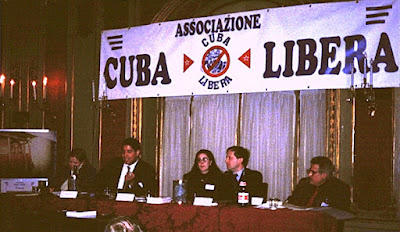Join our silent call for justice
``Justice does not help those who slumber but helps only those who are vigilant.''-- Mahatma GandhiIN A FEW DAYS the world will be marking the 40th anniversary of the systematic denial of human rights and basic human dignity in Cuba. The 50th Anniversary of the Universal Declaration of Human Rights was observed in Cuba by beatings and arrests of dissidents and human-rights activists leading up to and on the anniversary itself.
It is sad to note how far the Cuban government has sunk. It was 50 years ago that the Cuban delegation, representing a democratic and constitutional republic, wrote the first draft of the Universal Declaration of Human Rights. The members recognized that this document would have been ``accepted by that generous spirit who was the apostle of our independence: Jose Marti, the hero who -- as he turned his homeland into a nation -- gave us forever this generous rule: `With everyone, and for the good of everyone.' ''
Last Dec. 10 a spiritual heir of the 1948 Cuban delegation held up copies of the Universal Declaration of Human Rights and of the New Testament and was knocked down and dragged away by Cuban police. Today the mere support of those principles enunciated by the Cuban delegation in 1948 leads to beatings, arrests, and in some cases, deaths.
We shall raise here a silent call for justice. We shall use petitions, silent vigils, and fasts to raise the issue of justice for those who no longer can speak. We will not forget those innocents who died at the hands of the Cuban government such as:
We call on all people of goodwill to join our silent call for justice. Let others know of these travesties.On Dec. 22, 1997, Sebastian Arcos Bergnes died of a cancer that was allowed to spread until terminal while he sat with violent criminals in a Cuban prison cell. His crime was being a human-rights activist and the vice-president of the Cuban Committee for Human Rights. On March 29, 1997, Joachim Lovschall, a 26-year-old Dane studying Spanish at the University of Havana, was shot to death by Cuban state-security agents while crossing a street in Havana. Nearly two years later no disciplinary or lawful investigation of the guard who killed Lovschall has begun despite Denmark's official protests. On Feb. 24, 1996, Armando Alejandre Jr., Mario de la Peña, Carlos Costa, and Pablo Morales where blown out of the sky over the Florida Straits while searching for Cuban rafters in international waters. The Cuban pilots responsible for the shootdown have yet to face justice for their actions. On July 13, 1994, an estimated 41 men, women, and children were drowned by agents of the Cuban government for the sole crime of exercising their right to leave Cuba. The Cuban government has not held a proper investigation, brought those responsible to justice, or recovered the bodies of the victims and returned them to their families.
We have embraced the principle of nonviolence, and we seek the truth as our ends. Gandhi said:
``Use truth as your anvil, nonviolence as your hammer, and anything that does not stand the test when it is brought to the anvil of truth and hammered with nonviolence, reject it.''
Let us work so that in Cuba once again this will become a reality and not just a noble sentiment.
Chairwoman,
Vice President,
Treasurer,
Coordinator,
Free Cuba Foundation
Florida International University
Copyright © 1998 The Miami Herald


